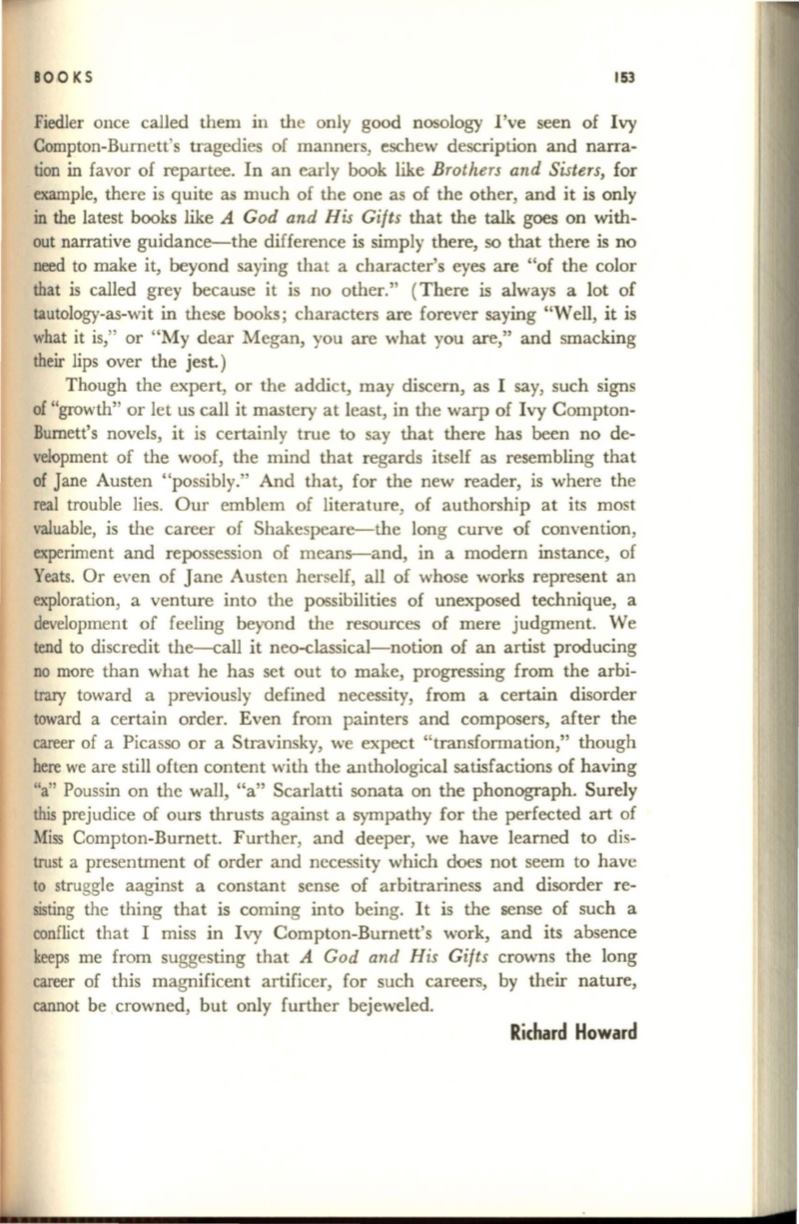
153
Fiedler once called them in the only good nosology I've seen of Ivy
Compton-Burnett's tragedies of manners, eschew description and narra–
tion
in
favor of repartee. In an early book like
Brothers and Sisters,
for
example, there is quite as much of the one as of the other, and it is only
in
the latest books like
A God and His Gifts
that the talk goes on with–
out narrative guidance-the difference is simply there, so that there is no
need to make it, beyond saying that a character's eyes are "of the color
that is called grey because it is no other." (There is always a lot of
tautology-as-wit in these books; characters are forever saying "Well, it is
what it is," or "My dear Megan, you are what you are," and smacking
their lips over the jest.)
Though the expert, or the addict, may discern, as I say, such signs
of "growth" or let us call it mastery at least, in the warp of Ivy Compton–
Burnett's novels, it is certainly true to say that there has been no de–
velopment of the woof, the mind that regards itself as resembling that
of Jane Austen "possibly." And that, for the new reader, is where the
real trouble lies. Our emblem of literature, of authorship at its most
valuable, is the career of Shakespeare-the long curve of convention,
experiment and repossession of means-and, in a modern instance, of
Yeats. Or even of Jane Austen herself, all of whose works represent an
exploration, a venture into the possibilities of unexposed technique, a
development of feeling beyond the resources of mere judgment. We
tend to discredit the-4:all it neo-classical-notion of an artist producing
no more than what he has set out to make, progressing from the arbi–
trary toward a previously defined necessity, from a certain disorder
toward a certain order. Even from painters and composers, after the
career of a Picasso or a Stravinsky, we expect "transformation," though
here we are still often content with the anthological satisfactions of having
"a" Poussin on the wall, "a" Scarlatti sonata on the phonograph. Surely
this prejudice of ours thrusts against a sympathy for the perfected art of
Miss Compton-Burnett. Further, and deeper, we have learned to dis–
trust a presentment of order and necessity which does not seem to have
to struggle aaginst a constant sense of arbitrariness and disorder re–
sisting the thing that is coming into being. It is the sense of such a
conflict that I miss in Ivy Compton-Burnett's work, and its absence
keeps me from suggesting that
A God and His Gifts
crowns the long
career of this magnificent artificer, for such careers, by their nature,
cannot be crowned, but only further bejeweled.
Richard Howard


